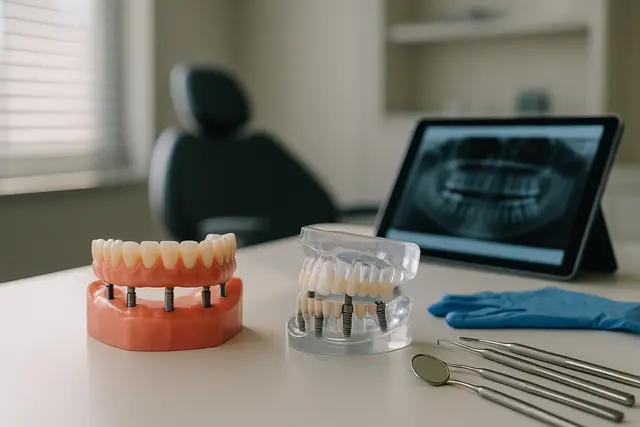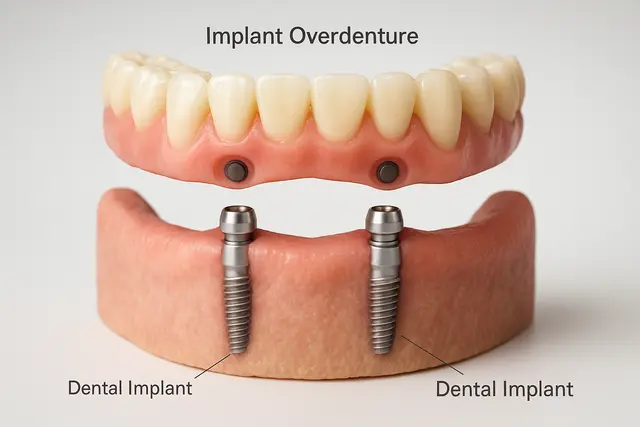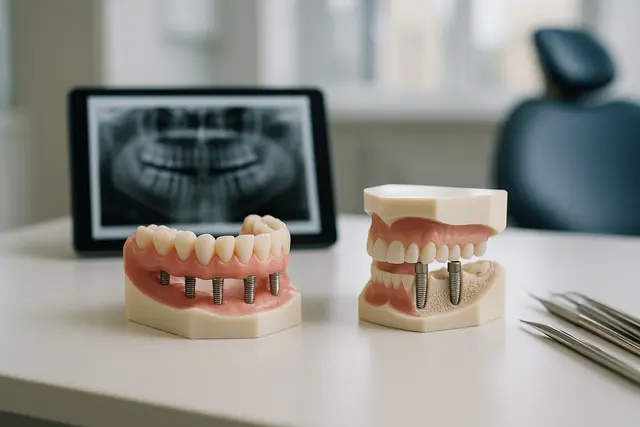Prosthodontics
5 min read
Oct 09, 2025
Dental Implant Complications After Surgery Patients Should Know
Dental implants are a popular and effective solution for restoring missing teeth, offering both durability and a natural appearance. However, like any surgical procedure, they come with potential risks. Understanding the complications that may arise after implant surgery can help patients make informed decisions and take steps to protect their oral health.

So, you’re thinking about getting dental implants. That’s a big decision, and a smart one, too. Dental implants have changed the game for people with missing teeth, offering a sturdy, natural-looking solution that can last for years (even decades) when done right. But like any surgery, there’s no magic wand. Complications can occur. Knowing what might go wrong ahead of time isn’t about scaring you off, it’s about helping you prepare for a successful implant journey.
How Dental Implants Work and Why People Love Them
Dental implants are artificial tooth roots placed into the jawbone to support the implant abutment and artificial teeth. Whether you’re replacing one missing tooth or several, dental implants work by anchoring securely into the bone through a process called osseointegration. Over time, the implant becomes part of your body, giving you the ability to chew, smile, and speak like you never skipped a beat.
But before you start picturing your perfect new smile, it’s important to understand what’s happening under the surface.
What Happens During Dental Implant Surgeries
Dental implant surgeries are typically done in stages. First comes implant placement, where the oral surgeon sets the implant into your jaw. Then, there’s a healing period (aka the fun wait) where your body gets busy bonding with the implant. After healing, the implant abutment is attached, and finally, the crown, the part that looks like a tooth, is placed.
While the success rate is high, this isn’t quick and easy. Your jaw, gums, and the implant site all need time to cooperate for the implant to take hold and support long-term success.
Common Dental Implant Problems You Should Know
Let’s start with the basics. Some implant side effects are normal. Swelling, bruising, and mild discomfort in the first few days after surgery? Totally expected. But what about the dental implant complications that go beyond the standard stuff?
One of the most common dental implant side effects is infection around the implant. This can happen if bacteria sneak in during or after the surgical procedure, especially if oral hygiene isn’t up to par. You might notice swelling, redness, or discomfort that doesn’t fade. Sometimes, the gum around the implant gets tender or even starts to pull away. This isn’t something to ignore.
Getting Dental Implants and the Risk of Implant Failure
Here’s the truth: not every dental implant becomes a lifelong partner. Implant failure can happen, especially if the implant doesn’t properly bond with the bone. This might occur if there’s not enough jawbone to support the implant, or if there’s too much pressure on the implant during healing.
Smoking, poor hygiene, and medical conditions like uncontrolled diabetes can also increase the risk of implant failure. And yes, sometimes the implant may be placed too close to a nerve or into a weak part of the jaw, which can lead to complications.
Understanding the Risk of Implant and the Red Flags
Some implant issues show up early, within the first few weeks. Others take months or even years to reveal themselves. A loose implant? Big red flag. Pain or tingling in your lips or chin? That could mean the implant is near a nerve. Any ongoing discomfort or gum issues around an implant site deserves attention.
And while it’s rare, sometimes bone loss around the implant or infections in the tissues surrounding the implant can sneak up long after the healing process. This is why regular dental checkups are non-negotiable.
Sinus Trouble and Implants in the Upper Jaw
Ah yes, the sinus. If your implant is in the upper jaw, you’ve got to be extra careful. Implants placed too close to the sinus cavity can lead to sinus infections, sinus pressure, or even sinus lifting procedures to make space. Not fun, but manageable with the right dental care and planning.
Your dentist may suggest a bone graft to build up the area if your upper jaw doesn’t have enough bone to support the implant. It’s better to take a little extra time than to face sinus-related headaches later on.
Hygiene Matters More Than You Think
Here’s where we get real. Cleaning the implant and the tissue around the implant is just as important as brushing your natural teeth. Good oral hygiene isn’t optional, it’s mission-critical.
Poor hygiene can lead to a condition called peri-implantitis, which is basically gum disease around the implant. Left untreated, it can lead to implant failure. Regular dental checkups, professional cleanings, and brushing twice a day will significantly reduce the risk of complications.
Graft Procedures and How They Support the Implant
Not everyone has the perfect jawbone ready to support the implant from day one. Sometimes, a bone graft or tissue graft is needed to bulk up the area before the implant procedure. This helps ensure that the bone and the implant fuse properly during osseointegration.
If your implant doesn’t have enough support, it could become loose or fail entirely. Think of the graft as the groundwork for your new smile.
Complications of Dental Implants and How to Spot Them
Here’s a checklist of common issues associated with dental implants:
Infection around the implant site
Loose implant or implant that doesn’t feel secure
Persistent pain or swelling
Sinus issues in the upper jaw
Bone loss or poor osseointegration
Pressure on the implant during healing
Inflammation in the tissues surrounding the implant
These signs aren’t a reason to panic, but they are a reason to call your dentist.
Minimizing the Risk and Enjoying Your Smile
You can’t control everything, but you can reduce the risk of implant failure with a few smart moves:
Quit smoking (it’s a big one)
Follow your dentist’s post-op instructions like gospel
Avoid chewing hard foods during the healing process
Don’t miss your regular dental checkups
Keep pressure off the implant site while it’s healing
Taking these steps will significantly reduce the risk of complications and ensure your implant journey stays on track.
When You Might Need Implant Removal or Replacement
Sometimes, despite your best efforts, things just don’t work out. If an implant becomes infected, shifts, or fails to integrate, your dentist may need to remove the implant and let the area heal before trying again. It’s not the end of the road, just a detour.
A new implant can usually be placed once the site is healthy again. The key is not ignoring early signs of trouble.
Essential Facts About Dental Implant Complications
Let’s be clear: complications can occur, but most dental implants are successful when placed by experienced professionals and cared for properly. Knowing the possible complications of dental implants doesn’t mean you should avoid them. It means you’re an informed patient, and that’s the best kind.
Whether you’re replacing one missing tooth or ditching a denture for good, implants offer a life-changing solution that looks and feels like your own teeth. With the right care, a solid hygiene routine, and a trustworthy dentist in your corner, your implant success story is waiting to be written.
What Are the Most Common Complications After Dental Implant Surgery?
Some of the most common complications include infection around the implant site, gum inflammation, and early implant loosening if the bone doesn’t bond well. Patients may also experience sinus issues with upper jaw implants or tingling from nerve irritation if placement is too close to a nerve. While swelling and mild pain are normal right after surgery, persistent or worsening symptoms should always be evaluated by a dentist.
Can Dental Implants Fail After Surgery?
Yes, implant failure can happen, especially if osseointegration, the fusion between bone and implant, doesn’t occur. Risk factors include smoking, poor oral hygiene, weak bone density, or underlying medical conditions like uncontrolled diabetes. Implants can also fail due to excessive pressure during healing or long-term gum infections such as peri-implantitis. While the failure rate is low, it’s important to understand this possibility before treatment.
How Can Patients Reduce the Risk of Implant Complications?
Patients can lower risks by maintaining excellent oral hygiene, quitting smoking, and following all post-surgery care instructions. Avoiding hard foods during healing, attending follow-up checkups, and using protective appliances like night guards (if you grind your teeth) also help protect the implant. Working with an experienced implant dentist and addressing issues like bone loss or sinus proximity before surgery further increases long-term success.
What Happens If an Implant Needs to Be Removed?
If an implant fails due to infection, poor integration, or bone loss, your dentist may recommend removal. After the site heals, bone grafting may be done to restore bone strength before placing a new implant. This process takes additional time but often allows for a second chance at successful implant placement. Removal doesn’t mean implants are no longer an option, it simply means the area must be stabilized before trying again.
Read Next
Related Posts

Prosthodontics
Implant Supported Dentures Overview
Missing teeth can impact more than just your smile, they can affect your confidence, comfort, and even your diet. Fortunately, modern dentistry offers a solution that’s both secure and natural-looking: implant-supported dentures. This innovative approach blends the stability of implants with the convenience of dentures to create a long-lasting, life-improving upgrade.
5 min read
Oct 29, 2025

Prosthodontics
Implant Overdentures Explained: The Hybrid Solution to Missing Teeth
Missing teeth can impact everything from your ability to eat to your self-confidence. While traditional dentures have long been a go-to solution, they often fall short in comfort and stability. Implant overdentures offer a modern alternative that combines the security of dental implants with the convenience of removable dentures, a true upgrade for those looking to reclaim their smile.
6 min read
Oct 29, 2025

Prosthodontics
Implant Retained Dentures Explained
Considering implant-retained dentures? You're not alone. As modern dentistry evolves, more people are turning to this secure, natural-feeling alternative to traditional dentures. This guide will walk you through what they are, how they work, and why they might be the solution you've been looking for.
4 min read
Oct 28, 2025
Don’t have time to research every dentist around you?
See why 30k+ patients trusted us